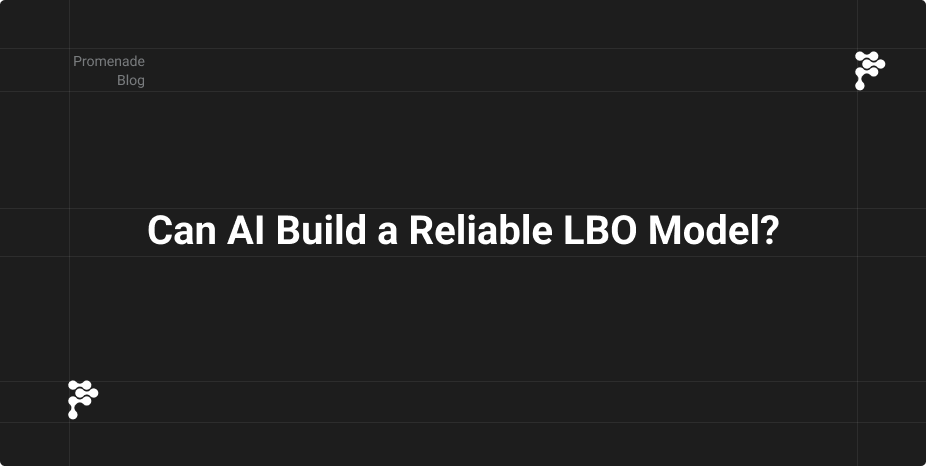Accelerating Deal Velocity: How AI Platforms are becoming the Indispensable Co-Pilot for Top Deal Teams
In the demanding realm of financial deal-making, the imperative to move quickly is a constant. Yet, this need for speed must always be balanced with the uncompromisable demands for precision, thorough due diligence, and insightful analysis. It’s within this dynamic that Artificial Intelligence (AI) platforms are decisively shifting from an emergent technology to an essential "co-pilot" for leading deal teams. For professionals in investment banking, private equity, and venture capital, AI is proving to be a transformative force, not by replacing human acumen, but by significantly augmenting it, thereby unlocking unprecedented levels of efficiency and strategic insight.
Defining the AI "Co-Pilot" in Financial Deal Teams
An AI "co-pilot" for financial deal teams is an advanced AI platform, purpose-built to assist and empower human professionals throughout the intricate lifecycle of a financial transaction. Its core function is to automate labor-intensive, repetitive tasks, distill critical insights from vast and complex datasets, and provide intelligent tools that enable dealmakers to dedicate their expertise to higher-value strategic activities. Unlike general-purpose AI, these specialized platforms are fluent in the language and workflows of finance, prioritizing accuracy, data security, and compliance to accelerate deal velocity while concurrently enhancing the quality of decision-making.
The Modern Deal-Making Dilemma: Balancing Speed with Deep Diligence
Today's financial landscape is characterized by an ever-increasing deluge of data. From market intelligence and financial disclosures to alternative data streams and proprietary internal knowledge, the sheer volume can quickly become a bottleneck. While the seasoned intuition and experience of dealmakers are irreplaceable, their efficacy is magnified when substantiated by comprehensive, data-driven insights. Sole reliance on experience, when faced with such data complexity, can decelerate processes or, more critically, lead to overlooked opportunities and underestimated risks.
AI platforms serve as a crucial bridge in this context. They possess the capability to process and analyze information at a scale and velocity unattainable by human efforts alone, thereby creating a solid analytical foundation. Upon this foundation, dealmakers can strategically apply their judgment, ensuring that rigorous diligence and profound analysis are maintained without impeding the pace required to succeed in a competitive market.
Understanding the AI "Co-Pilot": Key Technologies at Play
The power of these AI co-pilots stems from a sophisticated blend of technologies fine-tuned for financial applications:
- Machine Learning (ML): At its heart, ML enables systems to learn from data, identify complex patterns, and make predictions or classifications without explicit programming for every scenario. As leading institutions like Google Cloud AI outline, this is fundamental for tasks like predictive deal sourcing or flagging anomalies during due diligence.
- Natural Language Processing (NLP): NLP allows AI to comprehend, interpret, and generate human language. This is vital for extracting key terms from legal documents, analyzing sentiment from earnings call transcripts, or drafting initial summaries of lengthy reports, effectively enabling the AI to "read" and "understand" critical textual information.
- Retrieval-Augmented Generation (RAG): A pivotal innovation for ensuring reliability, RAG enhances large language models by grounding their responses in factual information retrieved from specified, verified knowledge bases. This ensures that AI-generated content, such as answers for due diligence or summaries for investment memos, is factually accurate and traceable to source data. As industry leaders like NVIDIA explain, RAG significantly reduces the likelihood of AI "hallucinations," fostering greater trust in AI-assisted outputs.
How AI Supercharges Key Stages of the Deal Workflow
An AI co-pilot can introduce significant speed and heightened efficiency across nearly every phase of the deal lifecycle:
- Enhanced Deal Sourcing & Screening: AI algorithms can tirelessly sift through diverse data sets, including traditional financial databases and emerging alternative data, to pinpoint potential acquisition targets or investment opportunities that precisely match a firm’s investment thesis, often revealing prospects that manual searches might overlook.
- Rapid Document Generation: The creation of Information Memorandums (IMs), Confidential Information Memorandums (CIMs), pitch books, and internal investment committee documentation is traditionally a highly manual and time-intensive undertaking. AI can now produce well-structured, data-rich first drafts of these critical documents in a remarkably short timeframe, often minutes rather than days.
- Deeply Accelerated & More Thorough Due Diligence: Due diligence is arguably where AI co-pilots deliver some of their most transformative impact. Instead of teams dedicating weeks to manually reviewing extensive data rooms, AI can rapidly ingest, index, and analyze thousands of documents. It can automatically flag potential risks, identify inconsistencies, and even pre-populate due diligence checklists with verifiable, source-linked answers, allowing human experts to concentrate on strategic interpretation and validation. This accelerated process is a key theme explored in analyses of AI's role in professional services by firms such as Deloitte.
- Proactive Risk Assessment: By discerning subtle patterns and correlations across vast datasets, including historical deal data, market indicators, and qualitative information from news or reports, AI can help identify potential risks earlier and with greater precision than traditional methods might allow.
The "10x Deal Team": Quantifiable Gains and Strategic Shifts
The integration of AI into deal-making processes is rapidly moving from a theoretical advantage to a demonstrable competitive necessity. Firms that adopt AI are not just seeing marginal improvements; they are witnessing substantial uplifts in productivity and output quality. According to insights from firms like McKinsey, generative AI holds the potential to unlock significant value across industries by augmenting workforce capabilities. For deal teams, this means handling more opportunities with existing resources, conducting deeper and more comprehensive analyses, and ultimately, making more informed, higher-quality investment decisions. The focus shifts from hours spent on manual labor to the strategic value delivered.
Selecting the Right AI Platform: Essential Capabilities for Financial Deal Teams
Choosing an AI co-pilot requires careful consideration, as not all platforms are suited to the specific demands of financial deal teams. The following table outlines key capabilities:

Successfully Integrating AI: A Practical Roadmap for Firms
Adopting an AI co-pilot effectively is a strategic journey. Consider these practical steps:
- Identify High-Impact Use Cases: Start by targeting specific, recurring pain points within your current deal workflow where AI can deliver clear, measurable value rapidly. Automating initial due diligence document review or accelerating the drafting of standard reports are often good starting points.
- Empower Key Talent: Introduce AI tools to your most adaptable and influential team members first. Their successes and positive experiences can champion broader adoption.
- Prioritize Data Strategy: The effectiveness of AI is intrinsically linked to the quality and accessibility of your data. Ensure your firm’s data assets are well-organized, readily accessible (with appropriate governance), and as accurate as possible.
- Measure, Iterate, and Scale: Define clear Key Performance Indicators (KPIs) to track AI's impact on deal velocity, team productivity, and decision quality. Use these insights to refine your approach and strategically scale successful AI integration across the organization. Strategies for managing such technological transitions are often discussed by advisory firms like Gartner.
Conclusion: The Future is Human Expertise, Augmented by AI
The narrative that AI will supplant human talent in the sophisticated domain of financial deal-making often overlooks the core value proposition. AI platforms are emerging as powerful co-pilots, meticulously designed to amplify the unique capabilities of skilled professionals. By freeing deal teams from mundane, time-consuming tasks, AI allows them to channel their energies towards strategic analysis, nuanced judgment, creative problem-solving, and the critical relationship-building that underpins successful deal execution.
The future of finance belongs to those firms that masterfully integrate the strengths of human expertise with the analytical power and speed of AI. By embracing AI as an indispensable co-pilot, deal teams can significantly accelerate their velocity, deepen the quality of their insights, and forge a sustainable competitive advantage in an increasingly dynamic market.
Frequently Asked Questions (FAQs)
- Will AI ultimately replace analysts and other dealmakers in finance?
The current trajectory indicates AI will augment rather than replace human dealmakers. While AI excels at data processing, pattern recognition, and automating routine tasks, essential human skills like strategic thinking, complex negotiation, building client trust, and adapting to novel situations remain irreplaceable. The objective is a powerful human-AI collaboration.
- What are the primary data security concerns when using AI for deal teams, and how are they addressed?
Key concerns include the confidentiality of sensitive deal information, data integrity, and regulatory compliance. Reputable AI platforms for finance address these through enterprise-grade encryption, strict access controls, options for secure deployment models (private cloud, on-premise), adherence to standards like SOC2, and firm policies against using client data to train general AI models. (For broader context on AI ethics and safety, resources from organizations like OpenAI are informative). - How can smaller or boutique firms realistically implement and afford advanced AI platforms?
Many AI solutions are offered via Software-as-a-Service (SaaS) models, which can lower upfront investment in infrastructure. Smaller firms should start by identifying specific, high-ROI use cases where AI can address a critical bottleneck. They should seek scalable, user-friendly platforms that do not require extensive in-house AI expertise to manage. - What type of training or upskilling is necessary for deal teams to effectively utilize AI co-pilots?
Deal teams do not typically need to become AI experts. Effective training should focus on understanding the AI platform’s specific capabilities and limitations, learning how to formulate effective queries, critically evaluating AI-generated outputs, and seamlessly integrating the AI tools into their established deal workflows and decision-making processes. - Beyond accelerating deal velocity, what are other significant benefits of AI for deal teams?
Beyond speed, AI offers improved consistency and quality in analysis and documentation, better capture and utilization of institutional knowledge, enhanced team morale as professionals focus on more engaging strategic work, and the ability to perform deeper, more comprehensive analysis than previously possible, leading to more robust and confident decision-making. - How do AI platforms ensure that the insights they provide are reliable and not just "AI hallucinations"?
Leading financial AI platforms increasingly use technologies like Retrieval-Augmented Generation (RAG). This approach grounds the AI's responses in specific, verifiable information retrieved from the firm's own documents and trusted data sources, providing citations and traceability, which significantly reduces the risk of fabricated or inaccurate information.
Ready to transform your private equity workflows and elevate your firm's productivity? Promenade AI is an advanced artificial intelligence platform specifically purpose-built for financial deal teams. We help you streamline investment workflows by automating research, accelerating due diligence, and instantly drafting critical deal documents.
Discover how. Request your personalized demo today.






